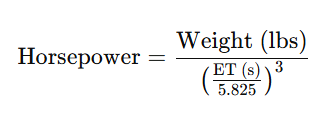🚗 Engine Horsepower Calculator
The Ultimate Guide for Using an Engine Horsepower Calculator: ET vs. Trap-Speed Methods Explained
In this comprehensive guide, we explore everything you need to know about engine horsepower calculator & estimating engine power using both the Elapsed Time (ET) Method and the Trap‑Speed Method. We’ll define what horsepower is and why it matters for automotive enthusiasts and racers alike, then walk through step‑by‑step calculations—complete with formulas—for determining engine horsepower manually. You’ll learn how to calculate engine horsepower using elapsed time method, understand the trap‑speed method horsepower formula explained, and see real‑world examples demonstrating each approach. We’ll also highlight some of the best online trap‑speed horsepower calculators for racing, compare ET method vs. trap‑speed method: which is more accurate?, and show you where to find a free engine horsepower calculator using vehicle weight and speed. Finally, discover the benefits of our accurate engine horsepower calculator with ET and trap‑speed options—a versatile car hp calculator, hp calculator car, and all‑in‑one horsepower calculator that’s designed for racers and gearheads of every level.
Understanding Engine Horsepower
Horsepower (hp) is a unit of power that measures the rate at which work is done—specifically, how quickly an engine can convert fuel into motion. In automotive terms, engine horsepower reflects the engine’s ability to propel a vehicle, making it a key spec for performance tuning and race applications. While torque measures rotational force, horsepower indicates how rapidly that force can be sustained, which translates directly into acceleration and top‑end speed.
Automakers often quote peak horsepower figures derived from dynamometer tests (brake horsepower), but racers and enthusiasts use on‑track metrics—elapsed quarter‑mile times and trap speeds—to estimate horsepower under real‑world conditions. This makes the engine horsepower estimator invaluable for DIY tuning, drag strip comparisons, and engine builds.
Calculating Horsepower Manually
There are two classic methods for estimating engine horsepower without a dyno: the Elapsed Time (ET) Method and the Trap‑Speed Method. Both rely on quarter‑mile (402.3 m) performance data, vehicle weight, and empirically derived constants.
Elapsed Time (ET) Method
The ET method uses the time it takes a vehicle to complete a quarter‑mile to approximate engine output. The formula is:

Here, 5.825 is an empirically determined constant that converts elapsed time into a cubic factor reflecting acceleration over 402 m.
Example: A 3,000 lb car runs the quarter‑mile in 12.00 s.

This approach is often called the “quarter‑mile horsepower calculator using ET,” and forms the basis of many free engine horsepower calculators online.
Trap‑Speed Method
The trap‑speed method estimates horsepower based on the speed attained at the quarter‑mile mark. The formula reads:

The constant 234 comes from fitting speed data to weight and power curves in drag strip testing.
Example: A 3,000 lb car hits 110 mph at quarter‑mile.

This trap‑speed horsepower formula is fundamental to any good online trap‑speed horsepower calculator for racing, giving a quick car hp calculator readout when you know only your terminal speed.
ET Method vs. Trap‑Speed Method: Which Is More Accurate?
Both methods yield close—but not identical—results. The ET approach factors in all resistive forces (friction, drag, gearing), since it’s derived from elapsed time, whereas the trap‑speed method focuses purely on terminal velocity, which tends to under‑report horsepower for cars with high drag coefficients or traction losses.
ET Method
Pros: Captures total performance over the full distance.
Cons: Sensitive to traction, gearing, and driver reaction.
Trap‑Speed Method
Pros: Simpler—only needs speed.
Cons: Less accurate for high‑drag or low‑traction setups.
For engine builders and racing teams, comparing both results provides a more complete performance picture. Some advanced calculators even average the two for a blended horsepower estimate, delivering an accurate engine horsepower calculator with ET and trap‑speed options.
Online Horsepower Calculator Options
If you’d rather skip manual computation, there are numerous online horsepower calculators—often labeled as car hp calculator, hp calculator car, or horsepower estimator. Most offer:
Both ET and trap‑speed methods in one tool
Unit selection for weight (lbs, kg, tons), time (seconds, minutes, hours, days), and speed (mph, km/h, m/s)
Instant, free engine horsepower estimation using your quarter‑mile data
These free calculators are ideal for hobbyists, workshop mechanics, and professional teams alike. Just input your quarter‑mile time or speed along with vehicle mass (including driver and cargo), and get instant horsepower numbers.
Choosing the Right HP Calculator for Your Needs
When selecting a horsepower calculator, consider:
Data Availability: If you only know your trap speed, choose a trap‑speed calculator; if you have precise elapsed times, use an ET‑based tool.
Unit Flexibility: Some calculators only handle pounds and mph; others let you pick kg, tons, km/h, and even days for time—handy for international users.
Accuracy Requirements: For dyno‑level precision, combine both methods or use averaged results; for quick ballpark figures, individual methods suffice.
Pro tip: Look for features like multiple units for weight (pound, ton, kg), time (second, minute, hour, day), and speed (mph, km/h, m/s) to match your data sources seamlessly.
Our Engine Horse Power Calculator Features
At the end of the drag strip or in your workshop, our bespoke horsepower calculator empowers you with:
Dual‑Method Calculation: Calculate engine horsepower using both the ET Method and the Trap‑Speed Method for cross‑validation.
Multi‑Unit Support: Select from multiple units for weight (pound, ton, kg), time (second, minute, hour, day), and speed (miles per hour, kilometers per hour, meters per hour).
Whether you need a car hp calculator for weekend runs or a professional hp calculator car solution for tuning projects, this tool delivers reliable, SEO‑optimized performance insights—loved by racers worldwide.
